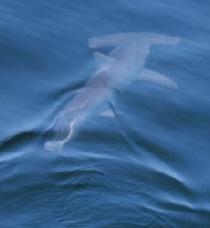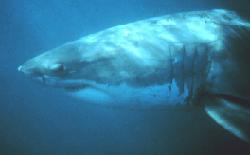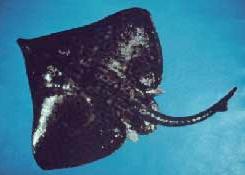|
Shark Populations Plunge in North Atlantic
By Cat Lazaroff
WASHINGTON, DC, January 21, 2003 (ENS) - Shark populations in the north Atlantic have plummeted by more than half since 1986, shows a new study by researchers in Canada. The decline, blamed largely on overfishing, has affected top predators including the great white and hammerhead sharks, impacting marine food chains in ways that are still being studied, the researchers said.
The scientists, from Dalhousie University in
Nova Scotia, Canada, looked at records of shark
catches between 1986, when fishers and fisheries
managers began keeping thorough records, and 2000.
Hammerhead sharks like this one photographed in
1982 are thought to be nearing extinction.
(Photo courtesy NOAA)
The team, led by doctoral candidate Julia Baum,
learned that during that time, all coastal shark
species saw population declines of 61 percent,
on average.
Blue shark numbers fell by 60 percent, tiger sharks by 65 percent, and thresher sharks by 80 percent.
Two of the largest species experienced some of the most devastating declines. Populations of great white sharks fell by 79 percent, while hammerhead numbers dropped by 89 percent.
"We estimate that all recorded shark species, with the exception of makos, have declined by more than 50 percent in the past eight to 15 years," the authors wrote in an article published in the January 17 issue of the journal "Science." Because of the slow maturation and low birth rate of most sharks, "recovery is expected to be slow," they add.
The researchers analyzed catch records from U.S. based longline fishing vessels seeking tuna and swordfish. While these vessels do not usually intend to catch sharks, which have limited value to them, they are required to report both their intended catch and their accidental catch, known as bycatch, to the National Marine Fisheries Service (NMFS).
These records form the largest set of data on sharks in the Northwest Atlantic. The researchers used them to extrapolate how the populations of shark species had fared over a 15 year stretch.
Julia Baum, now a doctoral candidate in biology
at Dalhousie University,
led the research that uncovered the sharks' decline.
(Photo courtesy Dalhousie University)
"Our results show that overfishing is threatening large coastal and oceanic sharks in the north-west Atlantic," the authors said. "The large and rapid declines we document are in addition to substantial historical reductions."
Ten years ago, longline fishers, who set mile long fishing lines with hundreds of baited hooks, changed their gear to allow sharks to free themselves from the lines. But the gear is not infallible, and the researchers say they factored in the altered fishing gear into their analyses.
The researchers said the problem is believed to extend around the globe, wherever longline fishing takes place and is not limited enough to prevent overfishing. Ransom Myers, a biologist at the University of Dalhousie and a coauthor of the report, has been developing models of how fishing could lead to the extinction of a variety of species, including salmon, turtles and sharks.
"Overexploitation of elasmobranchs (sharks, skates and rays) is known to have already nearly eliminated two skate species from much of their ranges," noted the team. "The magnitude of the declines estimated here suggests that several sharks may also now be at risk of large scale extirpation."
A large white shark cruising offshore from the
Farallon Islands in the Pacific Ocean.
(Photo by Scot Anderson, courtesy NMFS)
While the researchers said not enough research has been done to show clearly what effect the loss of these top predators may have on the rest of the food chain, "pervasive overfishing of these species may initiate major ecological changes," they said.
Marine reserves in which fishing is banned will not solve the sharks' problems, the researchers noted, because sharks are wide ranging species that would not stay within the borders of protected areas. In some cases, reserves may actually worsen the problem for migratory species such as sharks, they added, because fishers are forced to congregate in other areas, where they may take a heavy toll on local fish populations.
For example, reserves close to shore might offer some protection to coastal shark species, while increasing pressure on open ocean species of shark.
Overfishing has already led to the disappearance
of the barndoor skate, the largest skate, from
most of its historic range.
(Photo by Don Flescher, courtesy NMFS)
"Clearly, if marine reserves are to be effective, their placement is of critical importance, and conservation initiatives must explicitly consider impacts on the whole community of species," the researchers said. "Emphasis on single species conservation, without controlling effort, simply shifts pressure from one threatened species to another and may actually jeopardize biodiversity."
The best solution, the Dalhousie team said, may be to extend ocean-wide protection to sharks such as is now in place for some tuna species and for sea turtles.
"Our results indicate that they should be given conservation attention equal to that given other threatened large marine predators," they concluded. "We suggest that carefully designed marine reserves in concert with reductions in fishing effort could hold promise for safeguarding sharks and other large pelagic predators from further declines and ecological extinction."
Top
|



